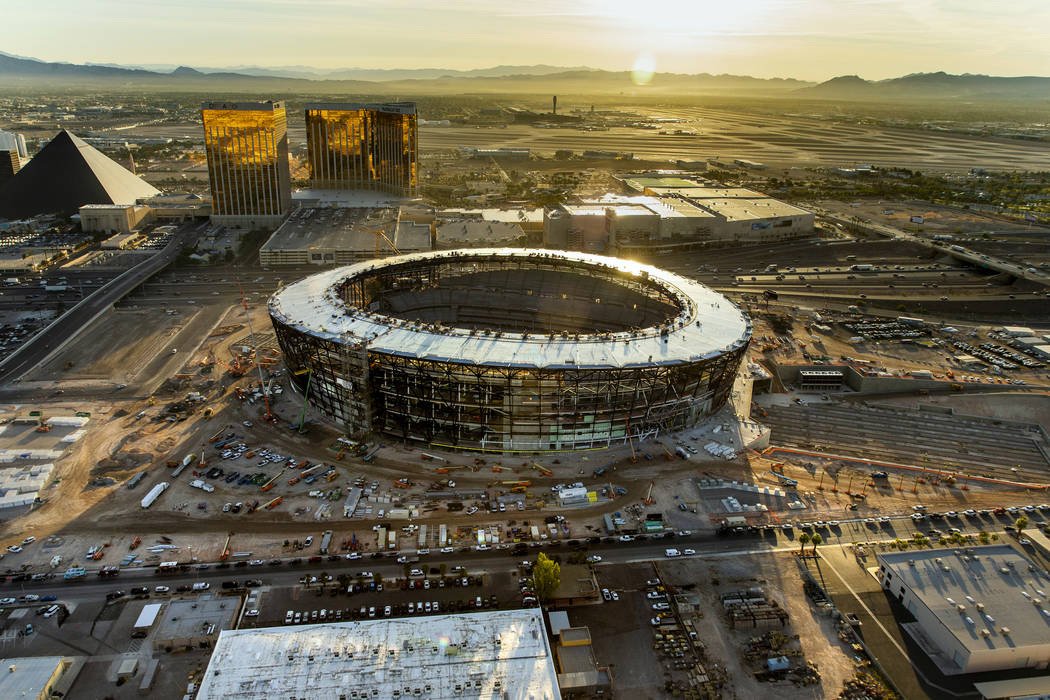Raiders’ exec: Broken bolts at stadium were overtightened, not faulty

Eight of the thousands of metal bolts used to attach the cable net supporting Allegiant Stadium’s translucent roof failed because they were tightened too much, not because they were faulty, the Raiders’ executive overseeing the project said Tuesday.
In an interview following his appearance Tuesday before the Nevada Republicans Club, Don Webb, chief operating officer of the Raiders’ stadium construction subsidiary, addressed news reports about the bolts’ failure, likening the matter to “overtightening and breaking a screw.”
Webb said as a precaution, construction executives delivered the broken bolts to a lab for metallurgical analysis. That inspection found nothing wrong with the bolts, but determined they had been overstressed when attaching the cable net to connecting points along the rim of the roof.
The issue first came to light last month when an independent monitor overseeing construction mentioned it in a report reviewed by the Las Vegas Stadium Authority.
Grand Canyon Development Partners, a project monitor hired by the authority to oversee work by the contractor on its behalf, briefed the board on the interruption of the cable lift and the rescheduling of work as a result of “overstressing of the structural members.” Grand Canyon concluded that the delay and resequencing of work “should not negatively affect the overall completion schedule.”
Because the cable net had been lifted to near the top of the stadium it enabled cranes to work beneath it and complete some of the inner bowl work ahead of schedule.
“Grand Canyon’s report further indicates material progress in terms of fireproofing, assembly of the stadium’s lanai doors, off-site ETFE roof section assembly, seating rail installation, suite construction, elevator installation and the exterior enclosure and that the contractor continues to advance finish work event, mezzanine and main concourse levels, ‘most of which is currently ahead of schedule,’” a monthly project status report to the authority delivered in November said. “This progress is attributed to approximately 1,950 workers on site daily and expanded work schedules.”
Webb on Tuesday squelched another report: that the “faulty” bolts came from China.
“I don’t have the time or the inclination or the curiosity for chasing down rumors, but one that I heard today was that the bolts are not only faulty, but they were snuck in from China. Not true,” he said.
“Out of 560,000 bolts on the structure, the number that were produced in China is zero. The eight bolts — eight out of 560,000 — broke because they were overstressed by the cables when it was going up.
“In the scheme of things and the large scale of this building, that’s like the equivalent of you and I building something at our house and bending a nail and pulling it back out. Or overtightening and breaking a screw. Eight bolts broke and that sounds really dramatic, but when you’re talking about a structure that’s 14 acres with 560,000 bolts and we overstressed, we know why they broke. We hit them too hard, we screwed them too tight.”
Webb said the bottom line is that because of the expanded workforce of various trade specialists on the site now, work is on a rapid pace in areas within the stadium most can’t see from the outside and that the project is still on schedule.
Grand Canyon Development agrees.
“Although work activities (primarily for finish work) are beginning to stack up, it is still possible to achieve substantial completion on the date originally contemplated, understanding that punch list and other non-essential work may not be completed at the time of issuance of the temporary certificate of occupancy. Non-essential work could be items such as back-of-house storage facilities, auxiliary locker rooms not necessary for early stadium activities, management office spaces, final commissioning of MEP (mechanical, electrical and plumbing) systems, punch list items and touch ups, etc,” the report says. “Beneficial occupancy by the Raiders can be accomplished. Move-in for the Raiders will be a hectic activity, and delivery and installation of furniture, fixtures and equipment will be completed over extended hours.”
Contact Richard N. Velotta at rvelotta@reviewjournal.com or 702-477-3893. Follow @RickVelotta on Twitter.